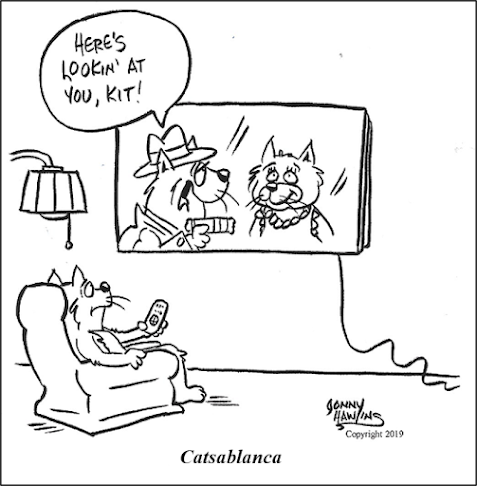Mitchell Hadley's Blog: It's About TV!, page 95
May 26, 2021
The Descent into Hell: Murder in the Cathedral (1936)


ow far back do you think television goes? Certainly back to the 1950s, and you're probably aware of programs that were broadcast in the late 1940s, but farther back than that? As far back as World War II? Even farther back than that, do you think?
How about 1936?
The BBC had been experimenting with television as early as 1930, and it began regular television service on November 2, 1936. However, a month earlier, the network made a test broadcast which has come to be recognized as BBC television’s "first identifiable drama," and it is this drama that provides us with the jumping-off point for today's discussion: T.S.Eliot's 1934 verse play about the martyrdom of St. Thomas Becket, Murder in the Cathedral.
t t t
When it comes to the life of St. Thomas Becket, it's probably best to follow the advise proffered at the conclusion of the movie The Man Who Shot Liberty Valance and print the legend, not the fact. The truth of the matter is compelling enough: Thomas Becket, Archbishop of Canterbury, formerly Lord Chancellor to King Henry II, died in 1170 in Canterbury Cathedral, assassinated by agents of Henry, following a long dispute during which Beckett sought to limit the authority of the State over the Church. The story of Becket's murder never fails to move; his fearlessness in the face of death, and willingness to sacrifice his life, can be seen in this eyewitness account by one of his biographers, Edward Grim, who was himself injured in the attack on Becket:
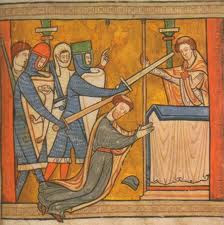 Detail of the murder of Becket,
Detail of the murder of Becket,taken from a 1225 Psalter
"...the impious knight... suddenly set upon him and [shaved] off the summit of his crown which the sacred chrism consecrated to God... Then, with another blow received on the head, he remained firm. But with the third the stricken martyr bent his knees and elbows, offering himself as a living sacrifice, saying in a low voice, 'For the name of Jesus and the protection of the church I am ready to embrace death.' But the third knight inflicted a grave wound on the fallen one; with this blow... his crown, which was large, separated from his head so that the blood turned white from the brain yet no less did the brain turn red from the blood; it purpled the appearance of the church... The fifth – not a knight but a cleric who had entered with the knights... placed his foot on the neck of the holy priest and precious martyr and (it is horrible to say) scattered the brains with the blood across the floor, exclaiming to the rest, 'We can leave this place, knights, he will not get up again.'"
A little over two years later, he was canonized as a saint and martyr by Pope Alexander III. In addition to being revered by the faithful, he has, thanks to plays, operas and novels, become one of the best-known of all the saints, his name synonymous with the struggle for religious freedom against government oppression.
Now, I'm sure there are medieval experts out there, perhaps even some who read this blog (though I can't for the life of me imagine why) who would point out that the details of Becket's life, and his interaction with both Henry and with his fellow churchmen are much more complex than the dramas written about him might suggest. But human beings are, after all, human. (God writes straight with crooked lines.) And anyway we're not writing the biography of St. Thomas; there are enough good ones out there. What we're interested in here is the lesson of St. Thomas Becket's life—the moral of the story, so to speak. That lesson is a heroic one, every bit as heroic as the true details of his death, with as much to tell us today as it did nearly 900 years ago, and it is best-told in Eliot's famous play.
t t t
Murder in the Cathedral was an interesting choice by the BBC, and perhaps an obvious one. It was currently playing at the Duchess Theatre, after having premiered only the year before in the Chapter House at Canterbury Cathedral—on location in the truest sense, only 50 yards away from the very spot on when Becket was murdered. Starring as Becket was Robert Speaight, whose performance in the role would win critical acclaim and launch him on a long and prominent career as an actor and writer.
The broadcast, which originated at the BBC's small studio at Alexandra Palace in London, consisted of several scenes transplanted from the Duchess, with Speaight as Becket and the play's producer, E. Martin Browne, in the dual role of the Fourth Tempter and Fourth Knight. In his book Adventures in Vision, John Swift references the significance of the broadcast, and how producer George More O'Ferrall realized television's potential to become a new and distinct medium. Murder in the Cathedral, Swift writes, "marked the beginning of the use of symbolic effects. In the stage version Becket sees the temptations in flesh and blood; in television these were presented as ghosts whispering in his ear, by skilful positioning and 'double takes.'" O'Ferrall himself explains how the scene allowed the production "to get away from both theatre and film."
We saw Thomas Becket in close-up, soliloquising about his temptations, and, as he weakened, the temptation appeared, whispering into his ear. As Thomas strengthened in purpose, the vision vanished. For, by placing the tempter before a separate camera, it was possible to superimpose the tempter on to the picture of Becket and fade it in and out at will.
O'Ferrall had other innovations in mind as well, including the use of a device called a Penumbrascope, which cast shadows onto backcloth, creating the illusion of architectural features such as archways—perfect for the period being depicted in the play. It was simple, quick, and created a much greater effect than the traditional use of black and white drop curtains.
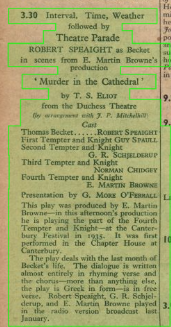 Murder in the Cathedral made its television debut in a test broadcast on October 19, about three weeks before the official start of service. Having successful passed the test, the play was broadcast at 3:30 p.m. on December 7 on a program called Theatre Parade, and was repeated again on December 21.
Murder in the Cathedral made its television debut in a test broadcast on October 19, about three weeks before the official start of service. Having successful passed the test, the play was broadcast at 3:30 p.m. on December 7 on a program called Theatre Parade, and was repeated again on December 21. t t t
During the course of the play, Becket is visited by four Tempters. The First Tempter urges Becket to choose safety and compromise with his old friend Henry, who made him first Lord Chancellor and then Archbishop of Canterbury. The Second Tempter tells him to return to serve the King, with the attendant wealth and power. The Third Tempter encourages Becket to unite with the barons in a coalition to overthrow Henry.
And then there's the Fourth Tempter.
E. Martin Browne, the producer of the play's original production at Canterbury, himself played the Fourth Tempter, and it was probably the Fourth Tempter that George More O'Ferrall was thinking of in particuarl when he described the special effects used in the broadcast. And for good reason: it is the Fourth Tempter who proves to be the most dangerous of them all. To Becket, he offers the ultimate Christian prize: martyrdom. At first it seems to be no temptation at all; after all, Becket can be almost certain that his course of action will inevitably lead to his death. But glory, with its attendant fame, is incompatible with martyrdom; it is an act not of self-sacrifice, but of pride.
Vanity of vanities, the Good Book warns us, all is vanity.
The ghostly Tempter whispers suavely in Becket's ear, teases him with the glory and honor that will posthumously accrue to his name. It is the pivotal moment of the play, and Becket's ultimate rejection of this siren song—his decision to accept his fate rather than seek it out—illustrates the centrality of his conscience in the choices he makes; he can do no other.
t t t
I mentioned earlier that there was an obvious reason for the Beeb to choose Murder in the Cathedral as its first televised drama. As critic Wheeler Winston Dixon wrote , "the main theme of Eliot’s play is the power of resistance to authority that one believes to be either corrupt or fraudulent. Since Eliot wrote the work in the shadow of Hitler’s rise to power in 1933, there can be little doubt that he had the usurping forces of fascism in mind as he composed Murder in the Cathedral."
Power is a strange thing: the more one has, the more one wants. And those who possess it, whether individuals or governments or other institutions of authority, are reluctant to ever give it up, even a fraction. What's more, they're likely to view as a threat anyone or anything that attempts to deny that power as a threat. To resist, in other words.
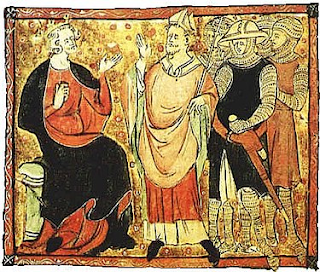 Becket challenges Henry, 14th centuryThe state has seen the church as a threat for as far back as either of them goes: it was how the Egyptians saw Moses, how Rome regarded Jerusalem, how Herod perceived the Messiah, how the Sanhedrin judged Christ, how Henry II viewed Becket. Few institutions guard their power as jealously as the state does, and anything that even remotely vies for the hearts of the people, a description that certainly fits religion. The state has always found something threatening in Christ's admonition to "render unto Caesar," given that the state generally views everything as being within its possession.
Becket challenges Henry, 14th centuryThe state has seen the church as a threat for as far back as either of them goes: it was how the Egyptians saw Moses, how Rome regarded Jerusalem, how Herod perceived the Messiah, how the Sanhedrin judged Christ, how Henry II viewed Becket. Few institutions guard their power as jealously as the state does, and anything that even remotely vies for the hearts of the people, a description that certainly fits religion. The state has always found something threatening in Christ's admonition to "render unto Caesar," given that the state generally views everything as being within its possession.Separation of church and state is enshrined as one of the fundamental principles of the American nation, yet the phrase doesn't appear anywhere in the Constitution. Thomas Jefferson made the phrase famous when he used it to describe the practical implication of the establishment clause in the Bill of Rights, which states that "Congress shall make no law respecting an establishment of religion."
But what does this mean? To Roger Williams, founder of Rhode Island, the wall of separation was intended to safeguard the church from the corruptions of the state, not the other way around. Certainly Benjamin Franklin, perhaps the most famous deist in American history, would agree; it was his belief that religion was "a preeminent resource for benevolence and charity," a necessary inspiration for the average American to do good. The Founders, then, saw the state as being informed by, rather than protected from, religion.
t t t
There is the vanity of the martyr seeking glory, and then there is the vanity of the leader seeking power.
It's been said people show their true colors during a crisis. It's where the rubber meets the road, where we see what people are truly made of when there's no place to hide. A noted political theorist once admonished his disciples that a crisis presents an opportunity that should never be wasted, and this is surely what happend with the virus lockdown of the past year.
Among the many "emergency" powers that leaders gathered and held to their breasts, one of the most notable was the supression of church services. In some places, they were banned altogether; other, more enlightened, communities limited them to a laughably small number of attendees. Some places, here and abroad, took the opportunity to eliminate any recourse to sacramental life, driving both ministers and parishioners underground. As the absurdity of this position became increasingly apparent, the justifications used by political leaders to keep such restrictions in place became increasingly contorted. That many religious leaders cooperated in these acts shows only that vanity is not the sole provence of the state.
Coincidentally or not, this odd period in history overlapped with the shadow being cast by the new administration as it assumed the seat of power.
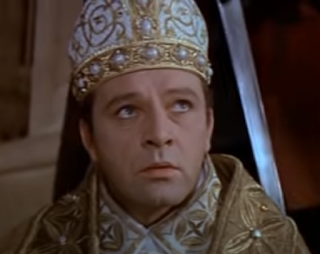 Richard Burton faces the executioner's sword in
Richard Burton faces the executioner's sword in 1964's BecketIt was, in fact, impossible to ignore an undercurrent of hostility to religion, especially as a usurper of the power claimed by the state. We were presented with a man touted as "devout" by his supporters, seemingly set on wiping out any protection afforded the country's religious institutions. And this gets to the crux of the dispute between Becket and Henry: royal supremacy over the English Church. The specifics of Becket's argument concerned jurisdiction over clergy who committed secular crimes, but as we witness the efforts of the contemporary state to impose secular law on churches and institutions regardless of how the law conflicts with religious belief, it's impossible not to see the parallels between 1170 and 2021.
King Henry is alleged to have famously asked, rhetorically, if no one would rid him of "this meddlesome priest," and his four knights acted. Today, the knights are big business and big politics, acting in service of the state, and so doctors and nurses are told to perform medical procedures that violate their beliefs; administrators are told to adopt policies that violate their beliefs; the faithful are told that their beliefs constitute hate speech, that those who stand up for those beliefs are to be ostrasized, put at risk of losing their jobs, threatened with bodily harm. Their social media is regulated or censored unless they conform to the "correct" set of beliefs, one approved by the secular authorities. Considering it all, Becket might have wondered just how this leader could be considered "devout." One would think that he could scarcely do more damage to the church if he set out to destroy it himself, to build back better with a more secular form of worship.
t t t
Between Acts 1 and 2 of Murder in the Cathedral, Eliot crafted an interlude from Becket's actual Christmas Day sermon of 1170, four days before the Archbishop's death. In that sermon, Becket reflects on "the strange contradiction that Christmas is a day both of mourning and rejoicing, which Christians also do for martyrs," and tells his flock that "it is possible that in a short time you may have yet another martyr." Coming as it does after Becket's rejection of the Fourth Tempter, it demonstrates his acceptance of his death with the certainty that good will eventually come from it.
About twenty years later, Eliot’s poem "The Cultivation of Christmas Trees" hearkens to that Christmas Day sermon. Eliot tells the story of a child who will, with age and wisdom, come to understand that "the joy of Christmas is disturbed not only by the premonition of the Passion, but also by the uncertainty of the Second Coming."
The accumulated memories of annual emotion May be concentrated into a great joy Which shall be also a great fear, as on the occasion When fear came upon every soul: Because the beginning shall remind us of the end And the first coming of the second coming.
It occurs to me that the 1936 broadcast of Murder in the Cathedral, primitive as it might have been, serves as a perfect metaphor for our times. For just as George More O'Ferrall's superimposed images prefigured today's special effects, St. Thomas Becket's confrontation with King Henry II prefigured today's confrontation between church and state.
And if Eliot is right that the Second Coming overshadows the joy of Christmas, so also does it overshadow everything we do today. After all, it was Thomas Jefferson—you know, the guy who talked about the separation of church and state—who also said, "Indeed I tremble for my country when I reflect that God is just: that his justice cannot sleep for ever." TV
Published on May 26, 2021 05:00
May 24, 2021
What's on TV? Sunday, May 26, 1974

 I don't know about you, but I find the sports lineup in today's Twin Cities issue quite interesting—not for the events themselves, but for what they say about the time. Here's what I mean: tennis was a very popular pasttime in 1974, and we've got four tennis-related events. Let's throw out Celebrity Tennis, even though that may be the most telling; the other three are all taped, and two of the three are from tournaments that were packaged for television. You don't see prerecorded sports like that anymore. And then there's the golf—the Danny Thomas Memphis Classic. It's still around, albeit with FedEx as the title sponsor, but nowadays the final round is shown in its entirety, rather than having coverage start on the 15th hole, as was the case here. Oh, and in 1974, the winner took home $35,000; last year, Justin Thomas won $1.8 million. And finally, there's the major event of the day, the Indianapolis 500, shown on a tape delay from the afternoon. The 500 was perhaps the last major sports event to be broadcast live, in 1986. Moving ABC's coverage of the race from the following Saturday's Wide World of Sports to same-day coverage was done to capitalize on the race's popularity. Today, NBC would probably do anything it could to keep it out of primetime coverage, such has been the decline in its fortunes. Yes, times have changed.
I don't know about you, but I find the sports lineup in today's Twin Cities issue quite interesting—not for the events themselves, but for what they say about the time. Here's what I mean: tennis was a very popular pasttime in 1974, and we've got four tennis-related events. Let's throw out Celebrity Tennis, even though that may be the most telling; the other three are all taped, and two of the three are from tournaments that were packaged for television. You don't see prerecorded sports like that anymore. And then there's the golf—the Danny Thomas Memphis Classic. It's still around, albeit with FedEx as the title sponsor, but nowadays the final round is shown in its entirety, rather than having coverage start on the 15th hole, as was the case here. Oh, and in 1974, the winner took home $35,000; last year, Justin Thomas won $1.8 million. And finally, there's the major event of the day, the Indianapolis 500, shown on a tape delay from the afternoon. The 500 was perhaps the last major sports event to be broadcast live, in 1986. Moving ABC's coverage of the race from the following Saturday's Wide World of Sports to same-day coverage was done to capitalize on the race's popularity. Today, NBC would probably do anything it could to keep it out of primetime coverage, such has been the decline in its fortunes. Yes, times have changed.-2- KTCA (PBS) AFTERNOON 5:00 BICENTENNIAL LECTURE SERIES EVENING 6:00 ZOOM—Children 6:30 NOVA—Science 7:30 WHO’S AFRAID OF OPERA? “Faust” 8:00 MASTERPIECE THEATRE “Upstairs, Downstairs,” Part 6 9:00 FIRING LINE Guest: Rep. Les Aspin (D-Wisconsin)
-4- WCCO (CBS) MORNING 7:00 SUNDAY MORNING 7:45 JOBS NOW! 8:00 BAILEY’S COMETS—Cartoon 8:30 AMAZING CHAN—Cartoon 9:00 CHILDREN’S FILM FESTIVAL “Six Bears and a Clown” 10:00 MOVIE—Comedy BW “Bonnie Scotland” (1935) 11:00 FACE THE NATION 11:30 SPORTSMAN’S HOLIDAY 11:45 WORLD OF AVIATION AFTERNOON 12:00 NEWS 12:30 SAINT—Crime Drama 1:30 CBS TENNIS CLASSIC Arthur Ashe vs. Cliff Drysdale 2:30 CBS SPORTS SPECTACULAR Diving, Equestrian show 4:30 NFL CHAMPIONSHIP GAMES 5:00 60 MINUTES EVENING 6:00 NEWS 6:30 APPLE’S WAY—Drama 7:30 MANNIX—Crime Drama 8:30 BARNABY JONES—Crime Drama 9:30 MOORE ON SUNDAY 10:00 NEWS
-5- KSTP (NBC) MORNING 7:30 HYMN TIME—David Stone 8:00 JIMMY SWAGGART—Religion 8:30 DAY OF DISCOVERY 9:00 FAITH FOR TODAY 9:30 AMERICAN RELIGIOUS TOWN HALL 10:00 HOUR OF POWER 11:00 HIGH SCHOOL QUIZ BOWL 11:30 MEET THE PRESS AFTERNOON 12:00 HENRY WOLF Guest: Buzz Aldrin 12:30 NORTH STAR REPORT 1:00 GORILLA IN THE BEDROOM Special 1:30 HOPES OR FEARS—Discussion Special 2:00 FAMILY CIRCLE TENNIS TOURNAMENT Special: Chris Evert vs. Kerry Melville 3:30 TO BE ANNOUNCED 4:30 KATE SMITH Guests: Florence Henderson, Dom DeLuise, the Supremes, Eric Weissberg, Steve Mandell, the Kids Next Door 5:30 UNTAMED WORLD EVENING 6:00 TREASURE HUNT 6:30 WORLD OF DISNEY “The Whiz Kid and the Mystery at Riverton,” conclusion 7:30 COLUMBO—Crime Drama Guest murderer: Jose Ferrer 9:00 NBC NEWS: SPECIAL EDITION 10:00 NEWS 10:30 PAUL HELM—Discussion 12:00 HENRY WOLF Guest: George Romney
-9- KMSP (ABC) MORNING 7:00 REX HUMBARD 8:00 KATHRYN KUHLMAN 8:30 NEW CASEY JONES—Children 9:00 KID POWER—Cartoon 9:30 OSMONDS—Cartoon 10:00 H.R. PUFNSTUF—Children 10:30 MAKE A WISH—Children 11:00 SENIOR CITIZENS’ FORUM 11:30 FOCUS—Phil Bremen AFTERNOON 12:00 FISHIN’ HOLE 12:30 ISSUES AND ANSWERS Guests: Sen. J. William Fullbright and Gov. Dale Bumpers, candidates for Democratic Senate seat, Arkansas 1:00 DIRECTIONS Guest: Sen. Harold Hughes (D-Iowa) 1:30 RAT PATROL—Adventure 2:00 NAME OF THE GAME—Drama 3:30 CELEBRITY TENNIS 4:00 WORLD INVITATIONAL TENNIS CLASSIC Rod Laver and John Newcombe vs. Stan Smith and Arthur Ashe 5:00 MY PARTNER THE GHOST EVENING 6:00 SECRETS OF THE DEEP 6:30 FBI 7:30 INDIANAPOLIS 500 Special 9:30 GREAT MYSTERIES 10:00 NEWS 10:30 MOVIE—Crime Drama “Madigan” (1968) 12:30 NEWS—Bill Beutel
11 WTCN (Ind.) MORNING 7:00 CHURCH SERVICE 7:30 SPEAKING OF RELIGION 8:00 OLD-TIME GOSPEL HOUR 9:00 ORAL ROBERTS 9:30 SOUL’S HARBOR—Religion 10:00 WONDERAMA AFTERNOON 12:30 FESTIVAL OF FAMILY CLASSICS 1:00 FATHER KNOWS BEST 1:30 BRACKEN’S WORLD—Drama 2:30 LUCY SHOW—Comedy 3:00 DANNY THOMAS MEMPHIS CLASSIC Special: Final-round coverage 5:00 STAR TREK—Adventure EVENING 6:00 MOVIE—Adventure BW “Tarzan’s New York Adventure” 7:30 ANDY GRIFFITH—Comedy BW 8:00 MERV GRIFFIN Guests: Maximillian Schell, Richard Thomas, Jason Miller, Randy Quaid 9:30 NEWS 10:00 MISSION: IMPOSSIBLE—Adventure 11:00 HIGH CHAPARRAL 12:00 IT TAKES A THIEF—Adventure
TV
Published on May 24, 2021 05:00
May 22, 2021
This week in TV Guide: May 25, 1974

 The Indianapolis 500, "auto racing's premiere event," takes center stage in the sporting world this Memorial Day weekend, so that's where we'll start.
The Indianapolis 500, "auto racing's premiere event," takes center stage in the sporting world this Memorial Day weekend, so that's where we'll start.The race is at a crossroads, following one of its most controversial runnings ever, in 1973. That year two drivers were killed in crashes (one during practice), and a mechanic in the pits died after being hit by a fire truck racing to the scene of one of the fatal accidents. The race itself took three days to run, rain interrupting both the first and second tries, and eventually ended after less than 350 miles when yet more rain finally brought it to a merciful end. The crowd, which had numbered more than 350,000 on day one, was less than 50,000 by the conclusion.
The problems are many, according to Hal Higdon's article, but center around the fact that technological advances have made the cars too fast, with neither the speedway nor the cars themselves prepared to handle the risks from increased speeds (over 30 mph in less than three years). The speedway has taken steps, firing the chief steward, widening the pit lane, and raising walls and pushing seating back (several spectators had been injured in driver Swede Savage's fiery fatal crash in 1973). The cars have also undergone changes, with fuel tanks cut almost in half, and aerodynamic adjustments designed to lower speeds by as much as 15 mph. Despite the changes, Higdon writes, the race still faces challenges: the speedway and the governing body "allowed speeds to soar dangerously past 200 mph with little more than talk," and he warns that "if unnecessary deaths continue, the so-called greatest spectacle in auto racing may not survive."
For several reasons, this article represents a moment frozen in time. Today, as speeds top 230 mph, we might wonder what all the fuss was about. Auto racing was infinitely more dangerous in the early 70s than it is today, even has it had become safer than it was in, say, the 1950s. Safety features have been introduced to both speedways and automotive structure, helping to absorb impacts and providing greater protection for the driver.
 Incredibly, Salt Walther survived this crash during the first
Incredibly, Salt Walther survived this crash during the first attempt to start the 1973 Indianapolis 500 Earlier this month the 27th anniversary of the death of the great Formula 1 champion Ayrton Senna was observed. Senna and driver Roland Ratzenberger were killed in separate accidents on one of the grimmest weekends in motor racing history* Similar concerns were raised over racing's future. And yet, to date only one other driver, Jules Bianchi, has died in a Formula 1 race. Dale Earnhardt and Dan Wheldon have died in accidents in recent years, but their deaths, too, are the last of their respective series. The fact remains that while motor sports are still dangerous, they are nowhere near as deadly as they were.
*A third accident nearly killed young driver Rubens Barrichello, and several spectators and track officials were also injured over the course of the San Marino Grand Prix weekend.
And yet the Indianapolis 500 is no longer the "greatest spectacle in racing," all of IndyCar having been surpassed by NASCAR in terms of popularity and talent. A divisive split in the Indy racing community created competing series, with neither having either the talent or the financial support to thrive. Indianapolis, caught in the middle, is still trying to recover, with empty seats and low television ratings out there for all to see.
The irony is that the bleak future forecast in the article has, in many ways, come to pass - but for entirely different reasons.
t t t
With live television of the 500 still a decade away, the race is being shown on Sunday night on a tape-delay basis. It's the first time in the history of the race that it is being held on Sunday; previously, the race had been held on Memorial Day itself*, but after the fiasco of 1973 it's thought that a Sunday race will allow people to attend on Monday should rain intervene again.
*Prior to 1970, Memorial Day was on May 30, as was the race. When Memorial Day fell on a Sunday, the race was moved to Monday. In 1970 Memorial Day itself became a Monday holiday; the first two 500s were held on Saturday, with the 1973 race being the first to run on the new Memorial Day. All races since then have been scheduled for Sunday.
As I mentioned earlier, the 500 isn't what it used to be. However, if you're looking for its great competitor, the Coca-Cola 600, you're going to have to travel to Charlotte to see it; the race, then known as the World 600, is not on live TV. Instead, we've got a nice assortment of minor sports to fill out Sunday, including the Family Circle Cup women's tennis final on NBC, the final round of the Danny Thomas Memphis Classic on an independent feed (I'm guessing Hughes Sports Network), diving and horse jumping on CBS Sports Spectacular. No baseball, which means the Twins must be at home.
t t t
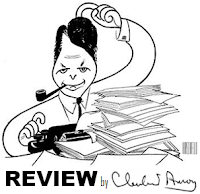 Throughout the 60s and early 70s, TV Guide's weekly reviews were written by the witty and acerbic Cleveland Amory. Whenever we get the chance, we'll look at Cleve's latest take on the shows of the era.
Throughout the 60s and early 70s, TV Guide's weekly reviews were written by the witty and acerbic Cleveland Amory. Whenever we get the chance, we'll look at Cleve's latest take on the shows of the era. As we come to the end of yet another television season, it's time once again for our favorite critic to look back at the past year and offer second thoughts on what he got wrong, and where the networks might have erred. In particular, four series—Dirty Sally, The Six Million Dollar Man, Happy Days, and The Magician—appear to have generated enough viewer response for Cleve to give them a rewatch, and a re-review.
Many readers thought Amory was too hard on The Magician, which he says is not the case; he likes both Bill Bixby and the willingness of the show not to rely on violence, so he apologizes if he gave the impression he didn't like it. As for Happy Days, he says, happiness "is in the eyes of the beholder. And what we've re-beheld here convinced us that either we've gone around the bend or our letter writers have. Certainly the show has." And this long before it jumped the shark! His opinion of The Six Million Dollar Man hasn't improved either; "Lee Majors' fans are legion. Maye, in his next show, we can join them." And Dirty Sally, the short-lived Jeanette Nolan spinoff from Gunsmoke, one letter writer asked him if he "prefers sex, rape, murder, violence, dope, crime and whathaveyou," to which he replies, "Just the whathaveyou." So, if you're keeping score at home, he was wrong about both Happy Days and The Six Million Dollar Man (big hits), right about Dirty Sally (single season), and wrong about The Magician (also single season).
Among Amory's other observations: the networks still don't "get" The Waltons ("you don't have to have bang-banbs or laff-laffs or even a million dollars to have a show of value"), praises both Kojak and Police Story, and sees War and Peace and Upstairs, Downstairs, both from Masterpiece Theatre as two of the finest examples of television today. But Cleve saves his highest honors for the NBC movie The Execution of Private Slovik; "Martin Sheen was superb and so was everything else about it." It was, he says, television at its best. And you can never have too much of that.
t t t
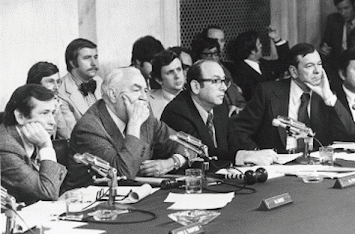 The breakthrough summer hit of the year is the House of Representatives hearing into the impeachment of President Nixon. It's a spin-off from the earlier joint House-Senate select committee hearings, which made minor stars out of lesser political hacks such as North Carolina Senator Sam Ervin, Tennessee Senator Howard Baker, judge John Sirica*, stoolie John Dean, and featured an appearance by future TV and movie star—and U.S. Senator—Fred Thompson as the minority council.
The breakthrough summer hit of the year is the House of Representatives hearing into the impeachment of President Nixon. It's a spin-off from the earlier joint House-Senate select committee hearings, which made minor stars out of lesser political hacks such as North Carolina Senator Sam Ervin, Tennessee Senator Howard Baker, judge John Sirica*, stoolie John Dean, and featured an appearance by future TV and movie star—and U.S. Senator—Fred Thompson as the minority council.*Who probably would have gotten The People's Court if it had existed back then.
This week's schedule calls for Tuesday, Wednesday and Thursday hearings, with either live or taped coverage. I haven't checked to see what might actually have aired, but I remember from the earlier go-around that the networks rotated coverage to assuage those who either weren't interested or couldn't do without their daytime stories.
The drama continues to playout until August, when Nixon resigns in the final episode. A reboot of the series is attempted in 1998-99 and again in 2020-21, but both times fails to attract an audience.
t t t
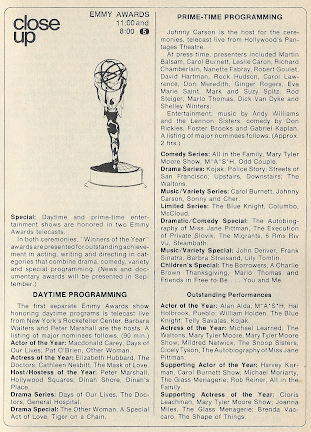 Let's see, what else might you be interested in this week? There are a lot of reruns kicking in, so we'll try to find something else. Dick Clark's at the beach in ABC's Action '74 on Saturday at noon. Bill Withers and the Staple Singers are the guests. NBC offers an Emmy Awards doubleheader on Tuesday, with the inaugural Daytime Emmys being presented at 11:00 a.m. CT, followed by the traditional Primetime Emmys at 8:00 p.m. Barbara Walters and Peter Marshall do the honors in the Daytime show, telecast from New York, while Johnny Carson hosts the nighttime extravaganza in Hollywood.*
Let's see, what else might you be interested in this week? There are a lot of reruns kicking in, so we'll try to find something else. Dick Clark's at the beach in ABC's Action '74 on Saturday at noon. Bill Withers and the Staple Singers are the guests. NBC offers an Emmy Awards doubleheader on Tuesday, with the inaugural Daytime Emmys being presented at 11:00 a.m. CT, followed by the traditional Primetime Emmys at 8:00 p.m. Barbara Walters and Peter Marshall do the honors in the Daytime show, telecast from New York, while Johnny Carson hosts the nighttime extravaganza in Hollywood.**An interesting but perhaps ill-advised feature of these Emmys is that in addition to the genre awards (Best Comedy Series, Best Drama Series, etc.), there are "Outstanding Performance" awards for "Actor of the Year," "Actress of the Year," etc., featuring the winners in the individual genre categories. Thus, Alan Alda in M*A*S*H faces off against Hal Holbrook in the special Pueblo, William Holden in the limited series The Blue Knight, and Telly Savalas in the drama Kojak.
"Upstairs, Downstairs" is the feature on PBS' Masterpiece Theater, as it was apt to be at any given time. ABC News Closeup does a show on stolen art at 7:00 p.m. on Thursday, while NBC News Presents counters at 9:00 p.m. with "The Pursuit of Youth." And then Let's Make a Deal's Monty Hall hosts a Sea World special on ABC Friday night; an hour later the same network has a Jacques Cousteau special on the octopus. Must have been a theme night.
t t t
An interesting bit of contentiousness in the Letters to the Editor section, as Stanley Borucinski of Riverside, NJ writes in to criticize a recent TV Guide editorial lamenting press censorship when it comes to covering crime. The editorial had referred to the recent example of a voluntary 90 day news blackout on vandalism in Webster City, Iowa. Proponents of the blackout felt that news coverage gave unwarranted publicity to the vandals, which would then result in increased vandalism.* The editor (in fact, probably Merrill Panitt) pointed out that during the period of the news blackout, vandalism in Webster City increased 36.5 per cent compared to the same month the previous year.
*Similar to the idea of not showing a drunk fan racing across the field during a football game; if you give him face time on television, you'll just encourage others to do the same.
Mr. Borucinski argues that what the media is really interested in is making money, and they know that crime coverage "sells better than good news," which means "the press exaggerates and sometimes even invents news." Panitt (we'll assume it was him) counters with a lengthy rebuttal of his own, in which he states that the increase in crime "seems to have been caused by a censored press," and concludes that "When facts are hidden or covered up, nothing improves as things usually get worse."
You might recall that in a 1976 TV Guide , the editors argued strongly that media exposure of the CIA's clandestine activities was harmful to American foreign policy, and concluded that while the public had the right to know how their government operated, "must we know everything about everything?" I think that's a fair point, and ultimately what the editors are saying is that the media has to exercise responsible restraint in how much of a story they tell, while still ensuring that the story itself is told. Not an easy task, but one would assume that teaching this kind of responsibility is what you should get in journalism school.
And if you thought that, you'd probably be wrong.
t t t
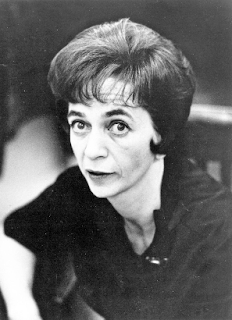 Judith Crist has one of her vintage rip jobs in her movie review section. Her first target is the family comedy Hello Down There, which she describes as an "Ivan Tors production apparently designed to give fans of his
Flipper
more—just a little more—of the same. It features
Judith Crist has one of her vintage rip jobs in her movie review section. Her first target is the family comedy Hello Down There, which she describes as an "Ivan Tors production apparently designed to give fans of his
Flipper
more—just a little more—of the same. It featuresTony Randall and Janet Leigh as the alleged adults in this travesty of a "family" film involving idiot parents (papa is a crazy inventor of an underwater house and mama gets her way by depriving him of you-know-what), moronic children (one suspects this is essentially a propaganda film for birth control), assorted television sub-personalities and a pair of dolphins. The dolphins get all the lines. A pity then didn't write them. Those who are willing to settle for insults to their intelligence in the guise of situation comedy are welcome to it—but why foist it on the young?
She also tears into The Christmas Tree, with William Holden as the rich father of a dying 10-year-old son, who contracted radiation poisoning from an accident involving a military jet off the coast of Corsica while the two were camping there.
The movie is obviously against nuclear contamination of the air and doom of kiddies. But beyond somehow suspecting that dear old dad is making his millions out of defense contracts, one needn't even comment on the vulgarity of dealing with so serious a subject on this level or the stupidity and tastelessness of the plotting. The film's ultimate message basically is that if you've got to die young, it's good to be rich to enjoy it. Depending on your taste threshold, of course, there may not be a dry eye—or a full stomach—in the house.No wonder she'd described the week as consisting of movies with "the slickery and banality that too many of us tolerate in our search for nonviolent non-sordid entertainment. It's an argument you saw often back then, and still see today—the idea that if you take sex and violence out of a movie, you're perforce left with little more than pablum. It doesn't have to be that way, and it shouldn't be. There is still a way to make tasteful, serious adult dramas—the question is, are there any adults left out there to enjoy them?
t t t
Finally, we close with the devastating news that, for the first time in its 21-year history, TV Guide is forced to increase the cover price of a single issue. Ever since the first issue on April 3, 1953, the price has remained 15 cents, but starting next week, it will climb to 20 cents. The annual subscription rate will go up as well, to $9.50.
Today, a single issue on the newsstands costs you $4.99, although a new subscriber rate runs $20 for 26 issues (every other week), and no local listings. That's what I call paying a whole lot more for a whole lot less. TV
Published on May 22, 2021 05:00
May 21, 2021
"Never, Never Say Die"—and the indestructable Christopher Lee

"Around the Dial" will not be seen this week so that we can bring you the following special presentation from the Christopher Lee Blogathon, running today through Sunday at many of your favorite blogs. Be sure to check our sponsors, Cinematic Catharsis and Realweegiemidget, throughout the weekend for the latest posts.
t t t
 From the moment Christopher Lee first appears on screen, with his back to the viewers, he commands our attention. It's the cold open to "Never, Never Say Die," from The Avengers 1967, and even though we only see him from behind, his presence dominates the screen.
From the moment Christopher Lee first appears on screen, with his back to the viewers, he commands our attention. It's the cold open to "Never, Never Say Die," from The Avengers 1967, and even though we only see him from behind, his presence dominates the screen. Imagine our surprise, then, when we see him face-to-face for the first time just moments before he’s struck head-on by an automobile. In the hospital, the doctor searches in vain for a pulse. But before he can be taken to the morgue, he rises up from the gurney, past a screaming nurse and the astonished driver who’d struck him, and strides out of the hospital. As the resident tells Steed and Mrs. Peel, there was no pulse, no respiration, no nothing. Obviously, then, the man was not dead. Except he was.
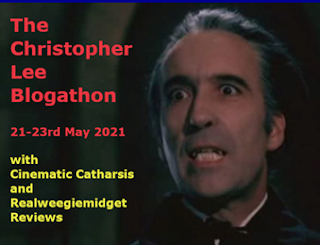 I suppose, not being a doctor myself (nor a television scriptwriter), there could be some medical explanation for this kind of phenomenon. The driver doesn't care, of course—he's just escaped a probable case of vehicular homicide. But then, as he's driving away from the hospital, a funny thing happens: he strikes another man standing in the middle of the road. What's even funnier is that it's not another man, it's the same man. The man who was dead until he wasn't, and now he's dead again.* He doesn’t even make it to the hospital this time, pushing his way out of a rogue ambulance and stomping into the forest, while the driver is left lamenting, "I've killed him again!" At this point, it's obvious we're beyond medical science—this can only be the surreal world of The Avengers.
I suppose, not being a doctor myself (nor a television scriptwriter), there could be some medical explanation for this kind of phenomenon. The driver doesn't care, of course—he's just escaped a probable case of vehicular homicide. But then, as he's driving away from the hospital, a funny thing happens: he strikes another man standing in the middle of the road. What's even funnier is that it's not another man, it's the same man. The man who was dead until he wasn't, and now he's dead again.* He doesn’t even make it to the hospital this time, pushing his way out of a rogue ambulance and stomping into the forest, while the driver is left lamenting, "I've killed him again!" At this point, it's obvious we're beyond medical science—this can only be the surreal world of The Avengers. *True, the driver may not be laughing about it, but as a disinterested observer, you have to admit the whole thing is pretty funny.
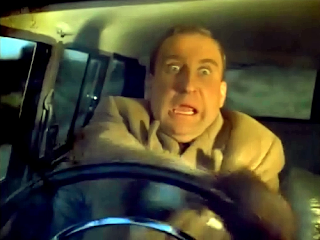 Well, how would you feel if you ran over
Well, how would you feel if you ran over someone twice and he still wasn't dead?Perhaps I've seen one too many episodes of MST3K, but Lee's character reminds me of nothing so much as "Butcher" Benton, the character played by Lon Chaney Jr. in Indestructible Man . I mean, nothing stops this guy: his double encounter with the car doesn't even leave a bruise; he's impervious to bullets; and it takes, what—a dozen men?—to bring him under control and drag him back to—but we'll get to that in a minute. And then there are the strange things that happen to him when a certain electronic frequency is activated. . . Let's just say that death has no hold over him, and leave it at that for the time being.
Thanks to a clue found on a stray piece of paper near the sight of the not-homicide, Mrs. Peel is able to trace things to a suspicious government research center called the Neoteric Research Unit. Steed, posing as a security liaison for an upcoming summit to be held at the center, is introduced to the director, Professor Frank N. Stone. (Yes you read that right.) And guess who the professor is? Right—Christopher Lee!
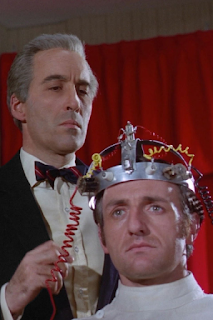 Stone demonstrates to Steed the top-secret project the institute is working on: creating a "brain print" of someone and transferring it into an android duplicate of that person, enabling that person's memories to be preserved forever in their robot twin. It is, says Stone, a way of "preserving the finest minds." And to top it off, the prototype android that they're working with is Stone's duplicate! So that's who's been creating all this havoc. It's not really right at this point to give away the conclusion—the episode is just too much fun. Suffice it to say that nothing—and no one—is what it seems to be.
Stone demonstrates to Steed the top-secret project the institute is working on: creating a "brain print" of someone and transferring it into an android duplicate of that person, enabling that person's memories to be preserved forever in their robot twin. It is, says Stone, a way of "preserving the finest minds." And to top it off, the prototype android that they're working with is Stone's duplicate! So that's who's been creating all this havoc. It's not really right at this point to give away the conclusion—the episode is just too much fun. Suffice it to say that nothing—and no one—is what it seems to be.Even for a generally delightful series like The Avengers, "Never, Never Say Die" is an unusually delightful—and satisfying—episode, a combination of the show's trademark wit and a premise that's probably a lot less sci-fi than it was when written over 50 years ago. The blend of humor and horror works wonderfully, never moreso than in the first scene following the opening titles, as we see Mrs. Peel engrossed in a television program that is suddenly interrupted by Steed's image, telling her that they are, once again, needed. That show she's watching? None other than the legendary Avengers episode "The Cybernauts," which—not coincidentally—involves creatures who are half men, half machines. (Surely Mrs. Peel must know how that one ends, since she was in the episode.) If this isn't the most meta moment in the series, it has to be a close second. And then there's the man assaulted with a banana, the robot growing a beard, and a wonderful analysis of the current political situation at the end.
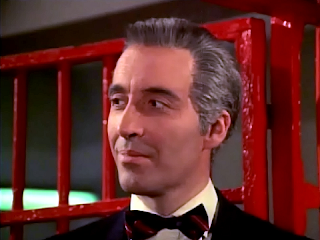 It's always a pleasure to see a star like Christopher Lee appear as a guest star on television, particularly with a juicy role like this. It is possible, I suppose, that "Never, Never Say Die" would have been just as good, just as much fun, with someone else in the pivotal role, but I doubt it. Lee plays things just right: brutal and menacing as the android, suave and urbane as the professor. (But still dangerous.) Most important, he toes the line between fear and farce precisely, giving the proper amount of gravitas to the character without being a stick-in-the-mud. Of course, having starred in all those Hammer horror flicks over the years gave him plenty of practice, but this kind of role demands that you play it straight. Lee plays it right down the middle of the fairway.
It's always a pleasure to see a star like Christopher Lee appear as a guest star on television, particularly with a juicy role like this. It is possible, I suppose, that "Never, Never Say Die" would have been just as good, just as much fun, with someone else in the pivotal role, but I doubt it. Lee plays things just right: brutal and menacing as the android, suave and urbane as the professor. (But still dangerous.) Most important, he toes the line between fear and farce precisely, giving the proper amount of gravitas to the character without being a stick-in-the-mud. Of course, having starred in all those Hammer horror flicks over the years gave him plenty of practice, but this kind of role demands that you play it straight. Lee plays it right down the middle of the fairway.I thought about spilling the beans and giving away the twists and turns that take us to the ending, but one of the reasons I don't do a lot of single-episode reviews here—unless I'm trying to prove a point of some kind—is because whenever I've seen something I really enjoy, I want others to be able to experience that same enjoyment.
This isn't the first time I've seen "Never, Never Say Die," and it won't be the last time, so it would be wrong to view it as a one-and-done. It's always a fun episode, just as The Avengers is always a fun series and Christopher Lee is always a delight to watch. For those of you who've seen "Never, Never" before, you might smile as you read this, and decide to watch it again this weekend. But if you've never, never seen it before, and you've gotten enough of a taste to decide you want the whole meal, then I'm not about to deny you discovering the pleasures of "Never, Never Say Die" for yourself. You'll be glad you did. TV
Published on May 21, 2021 05:00
May 19, 2021
With Samantha's Seventies, Adam-Michael James takes Bewitched into a new decade

 One of the oldest friends of the blog—not in terms of age, I hasten to add—is Adam-Michael James. I've been fortunate to interview Adam-Michael a couple of times in conjunction with two books he's written:
The Bewitched Continuum
, a fabulous companion to the TV series of the same name; and
I, Samantha, Take This Mortal, Darrin
, Adam-Michael's imagining of what Bewitched's final episode might have been like if today's custom of providing sendoffs for popular shows had been in effect back in 1972, when the show left the air.
One of the oldest friends of the blog—not in terms of age, I hasten to add—is Adam-Michael James. I've been fortunate to interview Adam-Michael a couple of times in conjunction with two books he's written:
The Bewitched Continuum
, a fabulous companion to the TV series of the same name; and
I, Samantha, Take This Mortal, Darrin
, Adam-Michael's imagining of what Bewitched's final episode might have been like if today's custom of providing sendoffs for popular shows had been in effect back in 1972, when the show left the air.Now, Adam-Michael is back with a third Bewitched book, Samantha's Seventies , in which he takes the show and its beloved characters into the new decade. with some fiun results. Naturally, this meant it was time for us to sit down and talk about it, which is something we do very well.
t t t
It's About TV: It seems like it's been ages since we've talked—what have you been up to? Adam-Michael James: Well, like everybody else, dealing with the current health crisis. I've been lucky in that I live in Prince Edward Island, Canada, which is a fairly small place, and we've only had a handful of COVID cases compared to most of the rest of the world. Although it wasn't intended, writing Samantha's Seventies ended up being my COVID project!
With Samantha's Seventies, you've taken Bewitched into a new decade. Obviously, Sam and Darrin are still together. It's nice to know some things haven't changed!
Can you imagine the hate mail I'd receive if Darrin and Samantha got divorced? [chuckles] Of course they're the show's main constant; any further story of Bewitched could only revolve around them.
Let's set that aside, then. [laughs] So what can we expect from the gang at 1164 Morning Glory Circle?
All the characters you know and love, a ton of Bewitched easter eggs—and I hope a lot of pleasant surprises! You're going to get not only one, but two Aunt Claras, the second being a younger version who gets into a Dynasty style catfight with someone you won't believe. The Stephenses navigate the possibility of another child joining their brood. Tabitha turns into a 25-year-old, which is a throwback to the Tabitha spinoff. We never had mortals and witches coming together for Christmas on the show, so they do here, with just the results you'd figure on and a few twists along the way. And finally, there was never a witch wedding, either, so two characters tie the supernatural knot in a ceremony I think is as poignant and moving as it is mysterious and magical. I really want for Bewitched fans to have as much fun reading this as I did writing it!
Your last book, I, Samantha, Take This Mortal, Darrin—which was a terrific book, by the way—was your imagining of what Bewitched's last episode would have been like if there had been one. What kind of reception you got from Bewitched fans. Did they enjoy the continuation of the story?
Pretty much everything I've heard has been very positive! The most consistent comment I got was that that book read like an episode of Bewitched, that the voices were true to the characters. And that's a compliment that pleases me no end, because I really did try to be as authentic as possible, and I've always maintained writing it was simply like taking dictation from these folks. I have to say the same was true writing Samantha's Seventies. So I hope readers will feel like they've been transported in some "lost episodes" here as well!
[image error]And so Samantha's Seventies picks up from there?
iSam, as I call it for short, ended with a great big wide open door—how the mortals in Samantha's life were going to handle the news they all had a witch in their lives. This was kind of the elephant in the room of the series, and it didn't seem like any finale would work without addressing it. But it really was a huge enough cliffhanger, it almost stopped me from going forward with the new book. In fact, I hadn't planned to. But then ideas started popping into my head and they didn't want to let go. It kind of all started with a "wouldn't that be funny?" thought about Tabitha waking up and going "Mother! I had the strangest dream that I worked at a TV station in LA and I drove this yellow car—it was so real!" [chuckles] gain, kind of acknowledging the Tabitha series. But it all circled back to, how are we going to deal with all these mortals knowing Samantha is a witch?
Because that really changes the dynamic of things, doesn't it?
Right. So I ultimately decided to split the book into stories told by year, with the first one specifically showing the ups and downs that Frank, Phyllis, Gladys, Larry, etc. experience adjusting to the magic. I didn't want to just have everybody accept it with no problems, nor did I want anyone to explicitly object and cut Samantha out of their life. So this runs the gamut of the grey areas, and I think folks will be pulled in to those varying levels, which range from absurdist comedy to straight-up drama.
There are a lot of people who, after a TV show wraps up, like to continue the story, to see what happens next. It's something I've done myself. But with Bewitched, your goal seems to be more than just writing new episodes of the sitcom—it's to allow the characters and the story to evolve naturally over time, rather than just remaining the same year after year. Am I right about that? And how does Bewitched lend itself to that kind of evolution?
Yeah, that was the thing: while the conceits of Endora casting spells on Darrin and slogans being dreamed up around whatever witchy predicament the Stephenses happened to be in at the time are part of the glue that held the show together, I think even toward the end of the run that well was getting a little dry. Simply having mortals know about witches was practically a 180-degree turn as it was, and that opened up even further chances for storyline evolution. Darrin already wasn't objecting to witchcraft as vehemently in the final seasons, and here we see him making further progress in that he allows Samantha to lead Tabitha and Adam through once-a-week witchcraft training. There's also evolution in the witch world, with some very important developments that take place during the Bicentennial. I wanted to constantly put our mortals and witches into new situations; the old standbys worked very well for the show, and I wouldn't dare try to do better with them than they did. I just wanted to take the main things we know about "Bewitched" and put fresh spins on them, to have characters interact that didn't get that chance on screen, while doing my best to stay tethered to the core elements that defined the series.
Bewitched went off the air in 1972, so we never really got to see the show inhabit the '70s. How has the world of the Stephens changed?
Well, culturally, technologically, societally—you saw how fast all that came along just during the run of the series. Certainly we came a long way in the '70s as well. That's what dividing the book into seven stories instead of limiting it to one allowed for—the chance to explore each year from 1973 to 1979, fleshing out the world the Stephenses were living in. I grew up in the '70s, so I wanted to make that world feel as real as possible. A lot of details were from memory, but I also did a good amount of research, which gave me an even wider palette from which to paint. You see the progression in Samantha's hairstyles, in the wardrobe. It extends to her world at large, as the energy crisis looms, and the music! Disco plays a prominent role, and given the climate we're in now, I went out of my way to choose songs almost exclusively by Black artists. It's not unlike watching the full run of the show, from black-and-white to the yellows and oranges of the hippie days where the show ended. I wanted the readers to experience the '70s metamorphosis right along with Samantha and Darrin.
Even though Bewitched was a fantasy-comedy, the show wasn't hesitant about tackling real-world social issues, kind of the same as Rod Serling did with Twilight Zone. What was it about Bewitched that enabled it to do this successfully, while it was also able to stay funny at the same time? Do you know what I mean?
I most absolutely do. I think a big part of that was the fact that these characters exist in a magical world—which makes some of those real-world issues easier to digest. Because of what the show was, even when they came up against prejudice and racism, it was always going to be dealt with in the context of some kind of witchy situation. That's why I think it worked, plus they were never really preachy or heavy-handed about it. I know that infusing messages about equality and unity was very important to Elizabeth Montgomery, and that's one of the biggest reasons I've tried to continue that tradition in my Bewitched imaginings.
[image error]The author, channeling the Seventies And that's something you do very well, in both books.
Thank you. My goal was to take things one step further on that score, and society's progression in the '70s created the perfect backdrop for it. There's a neat little arc where Tabitha and Adam deal with the repercussions of being both half-witch and half-mortal, and that leads to a revelation that reaffirms we really are more alike than we are different, no matter how stark those differences might be. We truly need reminders of that today - maybe even more than when Bewitched was in first run—and I am more than happy to take up the torch that Elizabeth Montgomery lit. I hope she'd be happy I did.
As we've seen recently in WandaVision, there's something timeless about the sitcom, something that allows the format to continue from decade to decade while remaining relatively intact. Is that kind of consistency what enables you to continue the story of Bewitched beyond the timeframe of the series itself? I have to sheepishly admit that I haven't yet seen WandaVision, though I've heard many great things about it. I agree that there's something timeless about Bewitched, not only because we're dealing with witches, but because the show is filled with beloved, memorable characters who seem to transcend the era they're limited to on-screen. For me, continuing their story feels very natural; it's been as if freeing them from the confines of television has opened the door to worlds of new possibilities for them.
How do you view the legacy that Bewitched leaves? We've had other shows dealing with the supernatural since then. How did Bewitched influence them?
Well, Bewitched does have the honor of being the first supernatural sitcom. So I would say that any magical show since—comedy or drama—has its roots in Bewitched. So that's hard not to be influenced by. Bewitched had the fun, but our witches also had their rituals and in later seasons they got into the mechanics of that world's witchcraft. Those are some very cool elements to be inspired by.
Is there a show out there that you'd consider its"successor"?
Honestly, I'd have to say no. As wonderful as other shows may be, as fascinating as their worlds might be, Bewitched was its own entity. The only thing I could ever see as a successor would be a proper continuation, but I think we're 20 or 30 years too late for that now. I guess that's why I came up with one on the page, even if it's not canonical and just my own imagining of how it might be.
Can we look forward to a continuation of the saga, maybe into the '80s?
Funny, I get a lot of people asking me that. [laughs] My first instinct is to say no, but that's probably because it hasn't been that long since I finished this latest saga. I didn't ultimately set out to write this book, either - except Samantha and everybody decided they had more that they wanted to say. Now how can you refuse a request like that? So you never know what they might still have to get off their chests.
t t t
One of the things I love about running It's About TV! over the years is that it's allowed me to meet so many people I never would have run into otherwise, people I'm fortunate to call friends. Adam-Michael James is one of them, and it's always a pleasure when we get a chancd to talk about the Bewitched universe. I hope you'll make Samantha's Seventies part of your television library.
Adam-Michael is also someone who understands that classic television shows don't have to be stuck in the past. Whether bringing the stories into the modern era or simply realizing that these vintage shows have something to tell us, it's proof that the world of classic television is far from being a dead one. TV
Published on May 19, 2021 05:00
May 17, 2021
What's on TV? Thursday, May 22, 1958

 I mentioned on Saturday that one of the most notable features in today's programming is the color broadcast of President Eisenhower at the grand opening of the WRC studios, but that's not the only thing worth watching today. "Bomber's Moon," tonight's presentation on Playhouse 90, is a war drama from Rod Serling; and Climax presents a tough story of tensions between farmers and ranchers in Texas (appropriate, since we're looking at the Dallas-Fort Worth edition) starring Lee Marvin, William Shatner, and Harry Townes. There's a fine lineup of variety shows with some swell guest stars. (Andy WIlliams with Pat Boone!) There are even some very good late night movies. (Berlin Correspondent, Mildred Pierce.) All in all, a night worthy of your consideration.
I mentioned on Saturday that one of the most notable features in today's programming is the color broadcast of President Eisenhower at the grand opening of the WRC studios, but that's not the only thing worth watching today. "Bomber's Moon," tonight's presentation on Playhouse 90, is a war drama from Rod Serling; and Climax presents a tough story of tensions between farmers and ranchers in Texas (appropriate, since we're looking at the Dallas-Fort Worth edition) starring Lee Marvin, William Shatner, and Harry Townes. There's a fine lineup of variety shows with some swell guest stars. (Andy WIlliams with Pat Boone!) There are even some very good late night movies. (Berlin Correspondent, Mildred Pierce.) All in all, a night worthy of your consideration.-4- KRLD (CBS) MORNING 7:30 CARTOONS—Kids 7:45 NEWS—Jim Underwood 8:00 CAPT. KANGAROO—Kids 8:45 NEWS 9:00 GARRY MOORE—Variety Guest: Carl Ballentine 9:30 HOW DO YOU RATE?—Quiz 10:00 ARTHUR GODFREY—Variety 10:30 DOTTO—Quiz 11:00 LOVE OF LIFE—Serial 11:30 SEARCH FOR TOMORROW 11:45 GUIDING LIGHT—Serial AFTERNOON 12:00 NEWS—Bill Burkett 12:15 BEAUTY THINGS—Michaels 12:30 AS THE WORLD TURNS—Serial 1:00 BEAT THE CLOCK—Games 1:30 HOUSE PARTY—Linkletter 2:00 BIG PAYOFF—Quiz 2:30 VERDICT IS YOURS—Trial 3:00 BRIGHTER DAY—Serial 3:15 SECRET STORM—Serial 3:30 EDGE OF NIGHT—Serial 4:00 DR. CHRISTIAN—Drama 4:30 CITY DETECTIVE—Police 5:00 WILLY—Comedy 5:30 NEWS 5:40 NEWS—Bob Brock 5:45 NEWS—Douglas Edwards EVENING 6:00 WEATHER 6:10 SPORTS 6:15 NEWS 6:30 SGT. PRESTON—Adventure 7:00 RICHARD DIAMOND—Mystery 7:30 CLIMAX—Drama “Time of the Hanging” 8:30 PLAYHOUSE 90—Drama “Bomber’s Moon” 10:00 NEWS—Bill Burkett 10:10 WEATHER—Jack Harrison 10:15 MOVIE—Drama “Next Time We Love” (1936) 11:45 NEWS—Jay Hogan
-5- WBAP (NBC) MORNING 6:55 WEATHER—Gene Reynolds 7:00 TODAY—Garroway Guests: the Swing Kings, Samm Sinclair Baker 9:00 DOUGH RE MI—Quiz 9:30 TREASURE HUNT—Quiz 10:00 PRICE IS RIGHT—Contest 10:30 TRUTH OR CONSEQUENCES 11:00 TIC TAC DOUGH—Quiz 11:30 IT COULD BE YOU—Leyden AFTERNOON 12:00 NEWS—Tom Whalen COLOR 12:30 KITTY’S WONDERLAND—Kids COLOR 1:15 MARGARET McDONALD—Women COLOR 1:30 STATION DEDICATION SPECIAL “Kitty Foyle” will not be seen today. 2:00 MATINEE THEATER—Drama COLOR “Day of Discoveries” 3:00 QUEEN FOR A DAY—Bailey 3:45 MODERN ROMANCES 4:00 I MARRIED JOAN—Comedy RETURN 4:30 DRAMA TIME 5:00 TEEN-AGE DOWNBEAT 5:40 NEWS, WEATHER—Vandeventer 5:45 NEWS—Huntley, Brinkley EVENING 6:00 TEEN-AGE DOWNBEAT 6:30 TIC TAC DOUGH COLOR 7:00 GROUCHO MARX—Quiz 7:30 DRAGNET—Jack Webb 8:00 PEOPLE’S CHOICE—Comedy 8:30 ERNIE FORD—Variety Guest: Phyllis Kirk 9:00 ROSEMARY CLOONEY COLOR Guest: Stan Freberg 9:30 JANE WYMAN—Drama “Hide and Seek” 10:00 NEWS 10:15 WEATHER 10:25 NEWS—Charles Murphy 10:30 SPORTS—Bud Sherman 10:35 JACK PAAR—Variety Jack is on vacation this week.
6 KCEN (Temple) (NBC) MORNING 7:00 TODAY—Garroway Guests: the Swing Kings, Samm Sinclair Baker 9:00 DOUGH RE MI—Quiz 9:30 TREASURE HUNT—Quiz 10:00 PRICE IS RIGHT—Contest 10:30 TRUTH OR CONSEQUENCES 11:00 TIC TAC DOUGH—Quiz 11:30 IT COULD BE YOU—Leyden AFTERNOON 12:00 WEATHER 12:05 FARM REPORT—Clark Bolt 12:25 NEWS—Jim Hamm 12:30 CURTAIN TIME—Drama 1:00 YOUR ALL STAR THEATER 1:30 STATION DEDICATION SPECIAL “Kitty Foyle” will not be seen today. 2:00 MATINEE THEATER—Drama COLOR “Day of Discoveries” 3:00 QUEEN FOR A DAY—Bailey 3:45 MODERN ROMANCES 4:00 I MARRIED JOAN—Comedy RETURN 4:30 HAPPY HOUR—Kids 5:00 MOVIE—Western “Back in the Saddle” (1941) EVENING 6:00 NEWS, WEATHER 6:10 SPORTS 6:15 NEWS 6:30 TIC TAC DOUGH COLOR 7:00 GROUCHO MARX—Quiz 7:30 DRAGNET—Jack Webb 8:00 PEOPLE’S CHOICE—Comedy 8:30 ERNIE FORD—Variety Guest: Phyllis Kirk 9:00 ROSEMARY CLOONEY COLOR Guest: Stan Freberg 9:30 JANE WYMAN—Drama “Hide and Seek” 10:00 O. HENRY PLAYHOUSE—Drama 11:00 JACK PAAR—Variety
-8- WFAA (ABC) MORNING 8:40 MORNING DEVOTIONALS 8:45 LAUREL AND HARDY—Comedy 9:00 ROMPER ROOM—Kids 10:00 JULIE BENELL 10:30 DOUGLAS FAIRBANKS—Drama 11:00 SUSIE—Comedy 11:30 MEET CORLISS ARCHER AFTERNOON 12:00 WEATHER 12:05 NEWS—Joe McKinney 12:15 MOVIE—Drama “Forever Amber” (1947) 2:00 OUR MISS BROOKS—Comedy 2:30 TOPPER—Comedy 3:00 AMERICAN BANDSTAND 3:30 DO YOU TRUST YOUR WIFE? 4:00 AMERICAN BANDSTAND Guests: The Four Aces 5:00 WOODY WOODPECKER 5:30 MICKEY MOUSE CLUB EVENING 6:00 WEATHER 6:05 NEWS—Dick Wheeler 6:15 NEWS—John Daly 6:30 CIRCUS BOY—Adventure 7:00 ZORRO—Adventure 7:30 REAL McCOYS—Comedy 8:00 PAT BOONE—Variety Guests: Andy Williams, the Vagabonds 8:30 NAVY LOG—Drama 9:00 MIKE HAMMER—Mystery 9:30 26 MEN—Western 10:00 WEATHER—Warren Culbertson 10:05 NEWS—Dick Wheeler 10:15 MOVIE—Comedy “Mr. Peabody and the Mermaid” (1948)
10 KWTX (Waco) (CBS, ABC) MORNING 8:00 CAPT. KANGAROO—Kids 8:45 NEWS 9:00 GARRY MOORE—Variety Guest: Carl Ballentine 9:30 HOW DO YOU RATE?—Quiz 10:00 ARTHUR GODFREY—Variety 10:30 DOTTO—Quiz 11:00 WOMEN’S NEWS—Marvel Russell 11:30 SEARCH FOR TOMORROW 11:45 GUIDING LIGHT—Serial AFTERNOON 12:00 NEWS—Walter Cronkite 12:05 NEWS—Russ Grovener 12:15 FARMS AND GARDENS 12:30 AS THE WORLD TURNS—Serial 1:00 BEAT THE CLOCK—Games 1:30 HOUSE PARTY—Linkletter 2:00 BIG PAYOFF—Quiz 2:30 VERDICT IS YOURS—Trial 3:00 UNCLE ELIHU—Kids 4:00 AMERICAN BANDSTAND Guests: The Four Aces 5:00 WOODY WOODPECKER 5:30 MICKEY MOUSE CLUB EVENING 6:00 NEWS, WEATHER 6:15 NEWS 6:30 26 MEN—Western 7:00 ZORRO—Adventure 7:30 CLIMAX—Drama “Time of the Hanging” 8:30 PLAYHOUSE 90—Drama “Bomber’s Moon” 10:00 NEWS 10:15 WEATHER 10:25 SPORTS—Ben Vaughn 11:00 MOVIE—Drama “Berlin Correspondent” (1942)
11 KFJZ (Ind.) MORNING 9:00 LITTLE RASCALS—Comedy 9:30 ABOTT AND COSTELLO 10:00 MOVIE—Comedy “The Ghost Comes Home” (1940) AFTERNOON 12:00 CARTOON CLUBHOUSE—Kids 1:00 MOVIE—Drama “Music in My Heart” (1940) 2:45 ANN ALDEN—Interview 3:00 AMOS ‘N’ ANDY—Comedy 3:30 MOVIE—Western “Song of Arizona” 4:30 CARTOON CLUBHOUSE—Kids EVENING 6:00 SOLDIERS OF FORTUNE 6:30 POPEYE-Cartoons 7:00 MOVIE—Drama “The Bugle Sounds” (1941) Ft. Worth TV Debut 9:00 MOVIE—Drama “Mildred Pierce” (1945) 11:05 MOVIE—Drama “Confession” (1937)
TV
Published on May 17, 2021 05:00
May 15, 2021
This week in TV Guide: May 17, 1958

 Although Danny Thomas is on the cover of this week's issue, the article within is actually about Marjorie Lord, the "second wife" to Thomas' character, Danny Williams, on his successful sitcom.
Although Danny Thomas is on the cover of this week's issue, the article within is actually about Marjorie Lord, the "second wife" to Thomas' character, Danny Williams, on his successful sitcom. Lord joined the show in the fourth season, after Williams' "first" wife, Jean Hagen, left the show (partly, it has been said, because of her acrimonious relationship with Thomas). The writers solved the problem by killing off Hagen's character Margaret between seasons; when the show resumed for its fourth season, Danny Williams was now a widower, it being explained that Margaret had "died suddenly" According to the always-reliable Wikipedia, this was the first time a main character had ever been killed off in a sitcom, though it certainly wouldn't be the last.
There are, generally speaking, three reasons why an actor leaves a television series: they're tired of or unhappy with the role, they leave because of a contract dispute or are simply fired, or they leave due to illness or death. It's always a roll of the dice when a cast change is made - some shows, like The Danny Thomas Show, adapt without missing a beat. Some, like M*A*S*H, evolve into a series with a much different tenor, while Doctor Who famously made the change in lead actors into an integral part of the show, introducing The Doctor's ability to change appearance through regeneration - a little trick that has enabled the series to continue (with one lengthy break) for over fifty years. Some, such as Bewitched, create a whimsical "which Darrin do you like best?" history, with fans forming camps behind one or the other actors. Some shows, like Route 66, suffer either artistically or in the ratings when they change main characters, losing whatever chemistry made the show a success; these series generally wind up in the cancellation bin.
The article itself doesn't go into the reaction that must have occurred when Hagen's character was killed off, noting only that "her absence has not hurt the popularity of the show, which has consistently landed in or near TV's Top 10." It will remain on television until 1964, which seems to qualify this change as a success. It could have been a failure though, and one wonders, if the recast show had bombed and it therefore became an accepted fact that you couldn't recast a main character, what television history might have been like.
t t t
 Starting in 1954, Steve Allen helmed his own NBC variety show which, at the beginning, aired opposite that of Ed Sullivan. It didn't run as long as Ed's, of course, but then Allen said his goal was never to conquer Ed, just to coexist with him, which he did for several seasons. Let's see who gets the best of the contest this week.
Starting in 1954, Steve Allen helmed his own NBC variety show which, at the beginning, aired opposite that of Ed Sullivan. It didn't run as long as Ed's, of course, but then Allen said his goal was never to conquer Ed, just to coexist with him, which he did for several seasons. Let's see who gets the best of the contest this week.
Sullivan: Ed's guests include French entertainer Maurice Chevalier; Sophie Tucker; comedian Jack E. Leonard; song stylist Sallie Blair, Carol Lawrence and the West Point Glee Club.
Allen: Steve's guests are comedians Lou Costello and Sid Gould; TV disc jockey Dick Clark; singers Beverly Kenny and Ronnie Deauville; columnist Abby Van Buren and Maurice Gosfield.
I've mentioned before that I enjoy these shows because they can tell you who was big at the time, but there's another level to it. You're really big if you don't have to be identified. For example, we're told that Maurice Chevalier is a French entertainer, that Dick Clark is a TV disc jockey, that Lou Costello is a comedian. But Sophie Tucker is just, well, Sophie Tucker. She was a singer, a very popular entertainer of the first half of the century, known as "The Last of the Red Hot Lovers." You might as well have mentioned "Western actor John Wayne"; that's how unnecessary a description is. Now, you're probably going to ask me about Maurice Gosfield. Well, he was no Sophie Tucker, but you might remember him as Pvt. Doberman on The Phil Silvers Show, or voice of Benny the Ball on Top Cat, and that's good enough for me. But I digress, don't I? This week's winner is Sullivan, by a song.
t t t
On a special 90-minute episode of NBC's Sunday afternoon news program Outlook, Chet Huntley looks at the forecast for the next ten years for Israel. The discussions center around irrigation, immigration and military training, all of which have played significant roles in Israel's history.
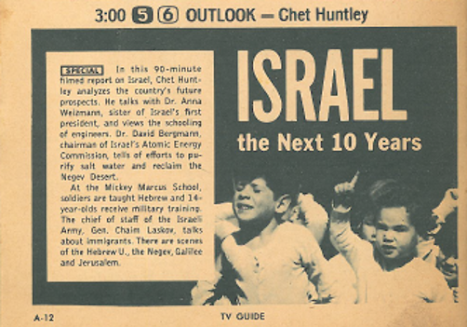
Now, the odds are that any ten-year period you look at in Israel's future is going to include either at least one outright war or multiple military conflicts of one kind or another. In this case, it's the Six-Day War of 1967, in which the Israelis launched a preemptive strike against Egypt, which had been massing troops along the common border. At the request of Egyptian president Nasser, who suffered massive losses in that initial attack, Jordan and Syria also became involved. When the dust had settled, less than a week later, Israel had scored a decisive military victory, capturing the Gaza Strip and the Sinai Peninsula from Egypt, the West Bank (including East Jerusalem) from Jordan, and the Golan Heights from Syria. It was a dramatic demonstration of the country's willingness to act aggressively and unilaterally to any perceived threat to its security. When you recall that the duration of wars used to be measured in centuries, the idea of a major war lasting less than a week is shocking.
Since then, the region has been no stranger to continued turmoil. If you were to choose another ten-year period, you'd likely run into the Olympic Massacre in Munich in 1972, the Yom Kippur War in 1973 (in many ways the sequel to the Six-Day War), the first Gulf War in 1991, and countless low-level exchanges and terrorist incursions, not to mention the raid on Entebbe*. You also would have seen the peace accords between Israel and Egypt, and Israel and Jordan.
*Many of which have been made into television movies and documentaries. One could do an entire piece, if not a book, on how the Middle East conflict has been portrayed on television.
Really, has there been any country in the post-World War II era that has had as dramatic a history as that of Israel? And I wonder if any of this could have been foreseen in Chet Huntley's report?
t t t
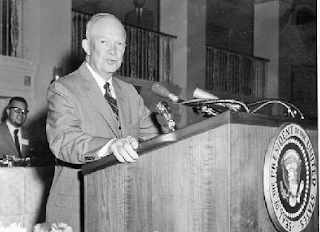 Keeping with the political theme, on Tuesday at 8:30 p.m., President Eisenhower delivers what is described as a "major address on the national economy" to the American Management Association, live from the Astor Hotel in New York City, and introduced by Vice President Nixon.
Keeping with the political theme, on Tuesday at 8:30 p.m., President Eisenhower delivers what is described as a "major address on the national economy" to the American Management Association, live from the Astor Hotel in New York City, and introduced by Vice President Nixon.I find this interesting on multiple levels, none of them concerning the actual content of the speech. For one thing, it's is being carried only on NBC; CBS and ABC both have their regular programming. That suggests the White House didn't ask all three networks for airtime. So did they purchase the time from the network, or did NBC cover it as if it were a news event? Did Eisenhower supporters purchase the time on behalf of the president? The likely answer—at least to me—is that the American Management Association bought the time themselves. Not only does it give the president's speech visability, it raises the profile of the AMA.
Nowadays a speech like this would be shown on the news channels—if, of course, it met their definition of news—and it wouldn't be any big deal. But in an era when Americans still weren't used to having their president as a regular visitor in their living room, this might have attracted quite a bit of attention. Only the fans of The Bob Cummings Show will resent it.
t t t
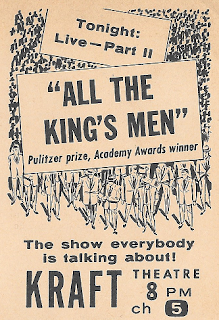 We're just on a political roll, aren't we? On Wednesday, Kraft Theatre (8:00 p.m., NBC) presents, live, part two of "All the King's Men," adapted by Don Mankiewicz from Robert Penn Warren's Pulitzer-Prize winning political Gothic horror novel, and directed by Sidney Lumet. I have to admit that until reading this issue, I was familiar only with the 1949 movie, which won an Academy Award for Best Picture, as well as a Best Actor Oscar for Broderick Crawford's magnificent performance as the demagogue Willie Stark. In the television adaptation, Neville Brand stars as Stark, with Maureen Stapleton as political operative Sadie Burke, the role that won a Supporting Actress award for Mercedes McCambridge, and Fred J. Scollay as journalist Jack Burden, played in the movie by John Ireland.
We're just on a political roll, aren't we? On Wednesday, Kraft Theatre (8:00 p.m., NBC) presents, live, part two of "All the King's Men," adapted by Don Mankiewicz from Robert Penn Warren's Pulitzer-Prize winning political Gothic horror novel, and directed by Sidney Lumet. I have to admit that until reading this issue, I was familiar only with the 1949 movie, which won an Academy Award for Best Picture, as well as a Best Actor Oscar for Broderick Crawford's magnificent performance as the demagogue Willie Stark. In the television adaptation, Neville Brand stars as Stark, with Maureen Stapleton as political operative Sadie Burke, the role that won a Supporting Actress award for Mercedes McCambridge, and Fred J. Scollay as journalist Jack Burden, played in the movie by John Ireland.Over the years, we've seen many television adaptations of well-known movies. Offhand, I don't know if any of those movies were as successful as All the King's Men had been. I also don't know if All the King's Men had yet appeared on home television in 1958; if not, I can certainly understand why a made-for-TV version would have been an attractive proposition. I do know that this Kraft Theatre production was critically successful; it made a star of Neville Brand, whom Time described as a "relative unknown" prior to this performance. Maureen Stapleton was nominated for an Emmy, and she and Brand won Best Actress and Actor at the 1958 Sylvania Television Awards. Too bad it's not online, but a kinescope does exist at the Wisconsin Historical Society.
t t t
You know, that's just about enough with politics; let's get on to something more interesting.
I've written off-and-on during this time period about Sid Caesar, who was never quite able to recapture the magic of his years with Imogene Coca on Your Show of Shows; as his star faded, he also struggled with an addiction to alcohol and drugs. In 1958, he's hosting Sid Caesar Invites You, his third series; he's been doing television, much of it live, more or less constantly for over eight years. It's no real surprise, then, that we read in the news and notes section that Caesar "is reported physically ill as a result of the severe strain of this current season." As a result, he's "had to reach into his happier past and buy sketches used on the Show of Shows which made him famous." A comic genius, and a troubled man.
We also read that the eccentric actor/comedian/pianist/composer Oscar Levant, currently hosting a talk show in Los Angeles, is being looked at to possibly have his show transferred to a national audience. I like Oscar Levant a lot: he had an acid, mordant wit; he was a complete neurotic who spent significant time in various mental institutions; a classical pianist who studied with Arnold Schoenberg, worked with Aaron Copeland, and was friends with George Gershwin and Al Jolson; a sidekick to actors like Fred Astaire in movie musicals, providing a necessary antidote with his sarcastic humor; and, as we read, a talk show host. As he once said, "There's a fine line between genius and insanity. I have erased this line."
Here he is in one of the very rare recordings of his own show, with guest Fred Astaire. The quality is pretty bad, but it gives you a very good feel for the show:
And here is a recording that demonstrates his classical music credentials, performing Gershwin's Piano Concerto in F Major from An American In Paris:
Like Sid Caesar, a very troubled man—and a very, very talented one.
t t t
The highlight of this week's sports calendar is the second jewel of horse racing's Triple Crown, the Preakness Stakes, telecast live on from Pimlico in Baltimore (Saturday, 3:30 p.m., CBS). Tim Tam, the Kentucky Derby winner, adds the Preakness to his resume, and becomes a heavy favorite to take the Belmont Stakes in three weeks, only to succumb to injury in the home stretch, finishing second to Cavan. His consolation prize: a long and successful stud career. Oh well—there's more than one way to measure victory, I guess. On Sunday, The Dinah Shore Show (8:00 p.m., NBC) features "actress" Ginger Rogers, "husband-and-wife acting team" Ida Lupino and Howard Duff, and "comedy duo" Mike Nichols and Elaine May. (See Sullivan vs. Allen for an explanation of that joke, if you've forgotten.) That's a winner in any book.
Film director King Vidor (The Champ, Duel in the Sun, War and Peace; nominated for five Academy Awards) plays himself in an episode of Burns and Allen (Monday, 7:00 p.m., NBC), looking for an emcee for the annual Screen Directors' Guild dinner. George Gobel, whose show alternates every other Tuesday with Eddie Fisher's, has Fred MacMurray as his guest for the last show of the season (7:00 p.m., NBC). Dan Duryea stars in the U.S. Steel Hour drama "Hour of the Rat" as a war veteran suffering from what we'd now call PTSD, who's vowed to kill the Japanese officer who made life in a prison camp a living hell (Wednesday, 9:00 p.m., CBS). Friday, Natalie Wood is one of the guests on The Frank Sinatra Show (8:00 p.m., ABC), while Jack Carter is the interviewee on Ed Murrow's Person to Person (9:30 p.m., CBS).
And what about Thursday, you ask? Well, it's one more trip into the world of politics, as President Eisenhower dedicates the opening of the new WRC radio and TV facilities in Washington, D.C. (1:30 p.m., NBC). And why do we care? Well, this:
At 1:23 into this brief video, NBC head David Sarnoff presses a button and the picture transitions from black-and-white to color; this valuable bit of footage is the oldest piece of color videotape in existence. It really is a striking image, isn't it? It's not the first colorcast, but just seeing the transformation shows us why television would never be the same, and I think that's the right note on which to end the week, don't you? TV
Published on May 15, 2021 05:00
May 14, 2021
Around the dial
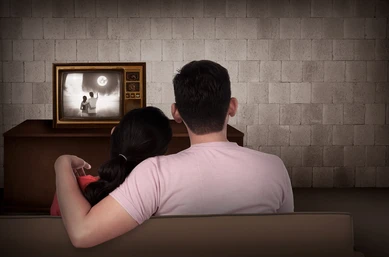
 We'll start this week with a couple of stories from MeTV—first, ths story on how Roy Huggins, creator of Maverick, was forced to
change the pilot episode
to keep him from collecting any royalties. Having seen my share of WB shows over the past few years, I can vouch for the familiarity of some of these plots—especially the ones written by .
We'll start this week with a couple of stories from MeTV—first, ths story on how Roy Huggins, creator of Maverick, was forced to
change the pilot episode
to keep him from collecting any royalties. Having seen my share of WB shows over the past few years, I can vouch for the familiarity of some of these plots—especially the ones written by .Next, and perhaps more disturbingly—well, we know that Jack Webb made Pete Kelly's Blues, and was married to Julie London, but does that qualify him to make an album of jazz standards? Be sure to not leave this story before listening to Jack's rendition of "Try a Little Tenderness." No, really.
Last week, you'll recall I linked to Bob Sassone's review of " The 100 Best Sitcoms of All Time " list by Rolling Stone. Well, this week David looks at that same list over at Comfort TV, and has his own thoughts on the subject. Amid the ones they got wrong, David promises they did get some right.
At Bob Crane: Life & Legacy, Carol and Linda introduce their new Hogan's Heroes podcast. It's going on the sidebar, and you should make it part of your regular podcast schedule as well. It's always fun to go behind the scenes, especially at Stalag 13.
Here's another website you might want to look in at from time to time: The Definitive Guide to Murder, She Wrote, with a hat-tip to the Metzinger Sisters over at Silver Scenes.
As you'll recall, we lived in Dallas for a few years, and made it out to the State Fair of Texas most of those years. Therefore, although I prefer the original version of the movie State Fair, I have a soft spot for the Pat Boone-Ann-Margret remake from 1962, because it takes place at that same State Fair. Rick reviews it this week at Classic Film & TV Café. (And yes, Big Tex is still there, even after the fire .
One thing I know for sure is that whenever I visit Cult TV Blog, there's a pretty good chance John's going to introduce me to a series I haven't followed, and this week is no exception. It's " A Case of the Stubborns ," an episode from Tales From The Darkside, and it includes an informative comment from our very own Mike Doran! TV
Published on May 14, 2021 05:00
May 12, 2021
TV Jibe: Wednesday Night at the Movies
Published on May 12, 2021 05:00
May 10, 2021
What's on TV? Monday, May 11, 1970

 I would have been 10 years old and living halfway across the contiennt when this TV Guide from Portland, Oregon came out (I'll let you do the math); and while school wouldn't yet have been out for the summer, I couldn't help but be reminded of how summer meant, at least some of the time, watching the daytime TV shows that you couldn't see otherwise because you were wasting time in school, having your individualism quashed. I mostly remember the game shows; I was never one for getting involved in the stories that my mother watched. But there's also Joan Rivers and her talk show on KATU; would I have watched that if it had been available in the Twin Cities? Maybe; I remember seeing Virginia Graham's Girl Talk. And of course every city had some kind of matinee movie, or even one in the morning like Abbott & Costello's Buck Privates on KPTV. And don't forget What's My Line? on KGW; maybe that's where I first saw Soupy Sales. But then, I'm sure you have memories of your own—maybe the listings from today will bring some of them back for you, too. I don't miss school, but I do miss summer vacation, that time when you can be a kid and not worry about anything. I won't be able to get back there until I retire. Which, if you did the math at the outset, you know isn't that far away.
I would have been 10 years old and living halfway across the contiennt when this TV Guide from Portland, Oregon came out (I'll let you do the math); and while school wouldn't yet have been out for the summer, I couldn't help but be reminded of how summer meant, at least some of the time, watching the daytime TV shows that you couldn't see otherwise because you were wasting time in school, having your individualism quashed. I mostly remember the game shows; I was never one for getting involved in the stories that my mother watched. But there's also Joan Rivers and her talk show on KATU; would I have watched that if it had been available in the Twin Cities? Maybe; I remember seeing Virginia Graham's Girl Talk. And of course every city had some kind of matinee movie, or even one in the morning like Abbott & Costello's Buck Privates on KPTV. And don't forget What's My Line? on KGW; maybe that's where I first saw Soupy Sales. But then, I'm sure you have memories of your own—maybe the listings from today will bring some of them back for you, too. I don't miss school, but I do miss summer vacation, that time when you can be a kid and not worry about anything. I won't be able to get back there until I retire. Which, if you did the math at the outset, you know isn't that far away.-2- KATU (ABC) MORNING 7:00 FAITH FOR TODAY—Religion -C- 7:30 LEAVE IT TO BEAVER—Comedy 7:55 FOR YOUR INFORMATION -C- 8:00 JACK LaLANNE—Exercise -C- 8:30 GRACE PHIPPS—Cooking -C- 9:00 QUEEN FOR A DAY -C- 9:30 JOAN RIVERS—Variety -C- Guest: Al Capp 10:00 DIVORCE COURT -C- 10:30 DELLA REESE—Variety -C- 11:30 THAT GIRL -C- AFTERNOON 12:00 NEWS—Ted Knight -C- 12:30 WORLD APART—Serial -C- 1:00 ALL MY CHILDREN—Serial -C- 1:30 LET’S MAKE A DEAL—Game -C- 2:00 NEWLYWED GAME -C- 2:30 DATING GAME -C- 3:00 GENERAL HOSPITAL -C- 3:30 ONE LIFE TO LIVE—Serial -C- 4:00 DARK SHADOWS—Serial -C- 4:30 BEWITCHED -C- 5:00 CANDID CAMERA 5:30 NEWS—Meyers/Wilkins -C- EVENING 6:00 RAWHIDE—Western 6:30 NEWS—Reasoner/Smith -C- 7:00 TO TELL THE TRUTH—Game -C- 7:30 IT TAKES A THIEF -C- 8:30 MOVIE—Adventure -C- “Assault on a Queen” (1966) 10:30 NOW—Report -C- “The Eye of the Storm” 11:00 NEWS—Dean Jones -C- 11:30 DICK CAVETT -C-
-3- KVDO (Ind.) AFTERNOON 3:30 VALLEY VIEW -C- 4:30 TEXAN—Western 5:00 DENNIS THE MENACE—Comedy 5:30 TIMMY AND LASSIE—Drama EVENING 7:00 GOLDEN VOYAGE—Travel -C- 7:30 MY FAVORITE MARTIAN—Comedy 8:00 NEWS—Drama “The Fighting Seabees” (1944) 10:00 NEWS, SPORTS—Holton 10:30 MAN IN A SUITCASE—Drama -C-
-6- KOIN (CBS) MORNING 6:30 SUNRISE SEMESTER -C- Iranian culture: modern trends vs. ancient traditions 7:00 NEWS—Joseph Benti -C- 7:30 WEATHER -C- 7:35 CARTOON CIRCUS -C- 8:00 CAPTAIN KANGAROO -C- 9:00 LUCILLE BALL -C- 9:30 BEVERLY HILLBILLIES -C- 10:00 ANDY GRIFFITH -C- 10:30 LOVE OF LIFE—Serial -C- 11:00 WHERE THE HEART IS—Serial -C- 11:25 NEWS—Douglas Edwards -C- 11:30 SEARCH FOR TOMORROW -C- AFTERNOON 12:00 NEWS -C- 12:05 HI! NEIGHBOR—Variety -C- 12:30 AS THE WORLD TURNS—Serial -C- 1:00 KOIN KITCHEN—Woman -C- 1:30 GUIDING LIGHT—Serial -C- 2:00 SECRET STORM—Serial -C- 2:30 EDGE OF NIGHT—Serial -C- 3:00 GOMER PYLE, USMC -C- 3:30 MANY-SPLENDORED THING -C- 4:00 MIKE DOUGLAS—Variety -C- Guests include Vivian Vance, Connie Francis, Errol Garner, Dody Goodman 5:30 NEWS—Duane Bock -C- EVENING 6:30 NEWS—Walter Cronkite -C- 7:00 TRUTH OR CONSEQUENCES -C- 7:30 GUNSMOKE -C- 8:30 HERE’S LUCY -C- 9:00 MAYBERRY R.F.D. -C- 9:30 DORIS DAY -C- 10:00 CAROL BURNETT -C- Guests: Vikki Carr, Flip Wilson 11:00 NEWS—Dave Eagon -C- 11:30 MERV GRIFFIN -C- Guests: Totie Fields, Brother Theodore, Ronnie Dyson
-8- KGW (NBC) MORNING 6:10 FARM NEWS -C- 6:15 TELECOURSE—Sex Education 6:45 EXERCISES—Joel Loprinzi -C- 7:00 TODAY -C- Guests: Sandler and Young [News at 7:25 A.M. and “Children’s Doctor” at 8:25 A.M.] 9:00 TELESCOPE—Variety -C- 9:30 CONCENTRATION—Game -C- 10:00 SALE OF THE CENTURY—Game -C- 10:30 HOLLYWOOD SQUARES -C- Guests: Jim Backus, Bob Cummings, Paul Lynde, Raymond St. Jacques, Lily Tomlin, Shani Wallis, Wally Cox, Rose Marie, Charley Weaver 11:00 JEOPARDY—Game -C- 11:30 WHO, WHAT OR WHERE -C- 11:55 NEWS—Floyd Kalber -C- AFTERNOON 12:00 NEWS—Rose Marie Scott -C- 12:30 DAYS OF OUR LIVES—Serial -C- 1:00 DOCTORS—Serial -C- 1:30 ANOTHER WORLD/BAY CITY -C- 2:00 BRIGHT PROMISE—Serial -C- 2:30 ANOTHER WORLD/SOMERSET—Serial -C- 3:00 PEYTON PLACE—Serial 3:30 STUMP THE STARS—Game -C- 4:00 LIFE WITH LINKLETTER -C- Guests: Stu Gilliam, William F. Hopkins 4:30 WHAT’S MY LINE—Game -C- Panel: Arlene Francis, Werner Klemperer, Soupy Sales 5:00 CAN YOU TOP THIS—Game -C- 5:30 NEWS—Ross/Cardis -C- EVENING 6:30 NEWS—Huntley/Brinkley -C- 7:00 DICK VAN DYKE—Comedy 7:30 MY WORLD -C- 8:00 LAUGH-IN -C- Guest: Dan Blocker 9:00 MOVIE—Adventure -C- “Journey to Shiloh” (1968) 11:00 NEWS—Ronald Holden -C- 11:30 JOHNNY CARSON -C- Guests: Jack Lemmon, Neil Simon
10 KOAP (NET) MORNING 9:10 CLASSROOM—Education 11:00 YOGA FOR HEALTH 11:30 SESAME STREET—Children -C- AFTERNOON 12:30 MISTEROGERS—Children 1:00 CLASSROOM—Education 2:15 IT’S HAPPENING 2:30 CLASSROOM—Art 2:45 FRIENDLY GIANT—Children 3:00 CONSERVATIVE VIEWPOINT Debut 3:30 SESAME STREET—Children 4:30 FRIENDLY GIANT—Children 4:45 TIME FOR JOHN 5:00 MISTEROGERS—Children 5:30 WHAT’S NEW—Children EVENING 6:00 BOATING—Lessons 6:30 CONSTRUCTION INSPECTION 7:00 FOLK GUITAR—Instructions 7:30 OREGON AT WORK—Documentary 8:00 WORLD PRESS—Report -C- 9:00 NET JOURNAL—Documentary -C- 10:00 TO BE ANNOUNCED
12 KPTV (Ind.) MORNING 7:00 TELECOURSE—Political Science 7:30 FLINTSTONES—Children -C- 8:00 CARTOONS—Children -C- 9:00 PATTY DUKE—Comedy 9:30 WORLD OF WOMEN -C- 10:00 MOVIE—Comedy “Buck Privates” (1941) 11:30 FASHIONS IN SEWING -C- 11:40 12 IN THE MORNING -C- 11:50 NEWS—Larry Curran AFTERNOON 12:00 CARTOONS—Children -C- 1:00 MOVIE GAME -C- Guests include Henry Fonda 1:30 NAKED CITY—Crime Drama 2:30 GALLOPING GOURMET -C- 3:00 NEWS—Steliges/Jones/Swing 3:30 SHE SAID! SHE SAID!—Game Guests include Peter Lind Hayes and Mary Healy 4:00 BEAT THE CLOCK—Game -C- 4:30 POPEYE’S PIER 12—Children -C- 5:00 ADDAMS FAMILY—Comedy 5:30 GILLIGAN’S ISLAND—Comedy -C- EVENING 6:00 STAR TREK—Drama -C- 7:00 BOXING -C- Special: Marcel Cerdan Jr. vs. Donato Paduano 8:00 McHALE’S NAVY—Comedy 8:30 DAVID FROST—Interview -C- Guest: Sammy Davis Jr. 10:00 NEWS—Hartfield/Steliges -C- 10:30 HONEYMOONERS—Comedy Return 11:00 MOVIE—Drama “Andy” (1965)
TV
Published on May 10, 2021 05:00
It's About TV!
Insightful commentary on how classic TV shows mirrored and influenced American society, tracing the impact of iconic series on national identity, cultural change, and the challenges we face today.
- Mitchell Hadley's profile
- 5 followers


